
22 minute read
FRIENDS OF ST PAUL’S
Friends of St Paul’s is a longstanding school institution composed of dedicated parents, community members and staff, who deliver a range of events and activities that benefit St Paul’s and enhance the student school experience.
Monthly meetings provide a unique opportunity for members to make connections with one another and with staff from across the school. The meetings also provide a forum for engaged discussion on school news and developments. New members are always welcome. Here are some reflections from key committee members - Tim Searle (President), Kareena Gale (Vice President) and Susan Ruming (Publicity Officer).
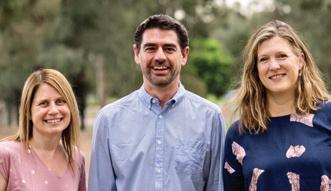
Left to right: Kareena Gale, Tim Searle and Susan Ruming
When and how did you become involved with Friends of St Paul’s?
TS: I joined Friends of St Paul’s in 2014 after helping the committee run the inaugural Cinema Under the Stars in October 2013. It was such an amazing event to be part of and opened my eyes to a community element of the school I previously didn’t know much about. KG: I became involved with Friends of St Paul’s in 2016. I was approached by Miss Cremona (Junior School Teacher) who was involved with Friends of St Paul’s at the time. She was seeking some more members to join the team so I thought I would go to a meeting and see what it was all about.
SR: I started attending Friends of St Paul’s meetings four years ago, when we moved to the area and my girls started attending St Paul’s in Year 6 and Year 4. Now they have just completed Year 10 and Year 8 and my son has just completed Year 5. I was fairly involved in the parents’ association at our last school, so I was interested in attending the Friends of St Paul’s meetings to gain insight into the workings of our new school.


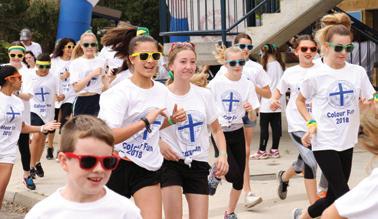

I was very impressed when the new Principal, Mr Wake, started to talk about building a new canteen/café, and keen to make sure they would have a good coffee machine for those early morning camp drop-offs and after school pick-ups.
What has been a highlight from your time with Friends of St Paul’s?
TS: The Bush Dance and Art Competition evening in 2016 is a highlight. It is possibly the largest event we have run to date, from the perspective of organisation and the multitude of elements. The success of the night could only have been achieved through the dedication of all members of the committee, as there were a lot of moving parts to bring it all together and make it the success that it was. This event stands out for me as it was the epitome of what Friends of St Paul’s is all about.
KG: A highlight for me would definitely be our first Colour Fun in October 2018. This event highlighted the wonderful community we have at St Paul’s. It was a day where students, parents and teachers became equal and covered each other in coloured powder. We had a dance party at the end of the run. The Secondary School playing fields became a rainbow of colour and every participant was covered in our six house colours – so much fun!
SR: I have been excited to watch how Friends of St Paul’s initiatives, like the Christmas Celebration, have grown over the years and become really important community events in the St Paul’s calendar. It is also great to see Friends of St Paul’s growing with new members coming along and adding their knowledge and skills to grow the success of events, such as the Trivia Night held in September this year. Being a member of Friends of St Paul’s has been a great way to meet new people in our school community. From that first event where I really didn’t know anybody (or what was going on) to now being able to chat with parents from all different year levels, really makes me feel like we belong to a very special community.
Christmas Celebration 2016
Volunteering is the ultimate exercise in democracy. You vote in elections once a year, but when you volunteer, you vote every day about the kind of community you want to live in.”
Author Unknown
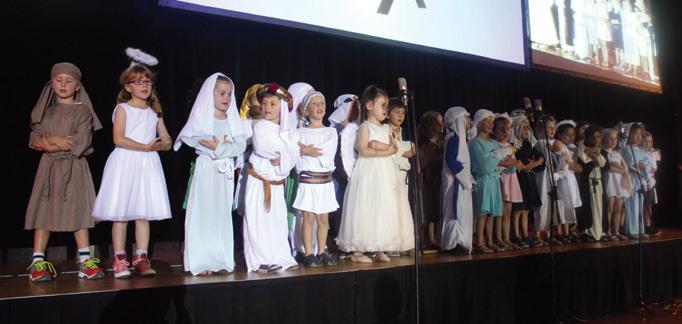
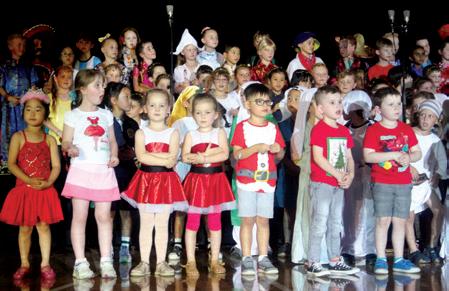
Spring Trivia Night 2019

Cinema Under The Stars 2014

Future plans? What is your vision for Friends of St Paul’s moving forward?
TS: Since taking on the role of President in 2015, my vision for Friends of St Paul’s has been to build on the community spirit of the school by coordinating social events to bring all areas of the school together. Whilst the events are designed to be self-funded, minimising the expense for families to participate, we have been able to add an element of fundraising to each event to assist in providing additional assets and services to the school to benefit the student body. My hope is to continue this focus and feed in any funds we raise to these ongoing projects as well as contribute to the school’s Master Plan.
KG: We have so many things planned for 2020 and beyond; events that will raise awareness and much needed funds to
Bush Dance 2016

see the school’s Master Plan come to life and create a stronger school community. Friends of St Paul’s is certainly more then just a fundraising channel. We have a community focus and believe in bringing families together to create a successful school environment for the students of today and tomorrow.
SR: I’m excited for the future of St Paul’s and with it, Friends of St Paul’s. The next building project will be an amazing addition to the school – the plans debuted at the Trivia Night looked fantastic! I am happy to support the project by helping the committee with their plans for more exciting events to support this project into next year and beyond. I’d also love to see Friends of St Paul’s grow with more members. I have gained so much from being involved and it feels good to contribute my ideas and help make a difference.
FATHERS AND DAUGHTERS’ BREAKFAST

ADRIAN LAMROCK

St Paul’s is committed to partnering with our parents and facilitating events that help reinforce positive relationships between parents and their adolescent children.
Over the past six years, St Paul’s has hosted breakfast events for middle school students and their parents, rotating between mothers and fathers with their sons and daughters.
On Thursday 29th August, the second of our breakfast events for this year was held in the Junior School Hall. Our Year 7 and 8 girls and their fathers were addressed by our guest speaker, Mr Adrian Lamrock, and enjoyed a sumptuous breakfast in honour of Father’s Day. Adrian, the founding principal of St Paul’s, is the father of three adult daughters and grandfather of six grandchildren. Having spoken with such warmth and wisdom at one of our earliest breakfasts some six years ago, it was delightful to be able to welcome Adrian back to St Paul’s a second time to share his insights and experiences with a totally new group of parents and students. We are very thankful Adrian was able to attend the breakfast, and also share some reflections on his own father-daughter relationships.
What are some ways fathers can build trust and connection with their daughters during adolescence?
At the outset, I have to say that I am extremely blessed in having three daughters who like their parents and get on incredibly well with each other. This has made a huge impact on the way we have operated as a family. In regard to building trust and connection, for me the main thing was listening to my daughters in as non-judgemental a way as I could. I had to learn that their opinions were important and needed to be evaluated alongside my own, especially as they developed their own ideas, principles, values and practices. Building trust was also very important and keeping confidences figured strongly as well. All of this showed that I, as a father, could respect my daughters as they became young women.
How can fathers expect their relationships with their daughters to change as their daughters enter adulthood? What are the constants?
The changes will be that daughters (and sons!) develop their own ideas, values and opinions which may differ, sometimes considerably, from their father’s. That’s fine as long as respect is shown and that these differences are still expressed within the context of love. That’s not always easy but it’s most important. The constants, for me, have been being available to fix things that sometimes don’t work well!
Do you have any fun anecdotes from your daughters’ childhood where they made you laugh?
Probably far too many to list here. We have a lot of funny family memories that we love to share when we get together. I remember taking the girls to ballet lessons on a semi-rural property near St Paul’s. When it rained they would wade to their lessons in leotards and gumboots over planks in the flooded yard full of pet goats! Then there are the tales of our geographically challenged daughter who rang me and said “Dad, I’m lost. Where am I?” She was the one who also said “Yes, I’d love to go on a mission trip to Myanmar. I’ve always wanted to go to Africa!”. Another of our girls achieved family fame by not being able to find the thing that was, often, right under her nose and where she had left it. At other times, anecdotes will be turned around to focus on my own shortcomings. My daughters are good at doing that and it helps keep me humble! It’s nice that there is a mutual love which allows us to do this.
What is your favourite thing about your relationship with your daughters?
This may sound silly but the fact that I am their father. It’s an enormous privilege and has been a considerable responsibility, which I have shared with my wife. I’m enormously proud of the women they have become and, I think they are, on the whole, happy to have me as a father. I’ve said elsewhere that “fathers never lose their daughters” and that’s certainly been the case for me.


I’m still around to be called, to help and to give advice, sometimes whether it’s needed or not!
How do you keep nurturing the bond?
Spending time with them, their husbands and their children. Family times are very important for us. And we talk. Lots. I’m grateful that our daughters communicate so well with each other. It’s often said that “it takes a village to raise a child” and our family seems to be an effective “village” in caring for and relating to our grandchildren.
Top tip for a healthy fatherdaughter relationship?
Talk to and listen to each other. Value them and respect them as individuals. Be available when they need you. Spend time together.
CHRISTOPHER HADDAD
St Paul’s alumni, Christopher Haddad, recently visited the school following the completion of his PhD. Christopher graduated from St Paul’s in 2009.
He then attended Macquarie University and attained a Bachelor of Ancient History (Hons) and a Master of Research. While completing his PhD in Ancient History at Macquarie, Christopher also completed postgraduate studies in Rome, Oxford and Geneva. Christopher graduated with his Doctorate in September this year and has since commenced a Bachelor of Arts in Oriental Studies (Sanskrit) at Harris Manchester College of the University of Oxford.
What was your favourite subject at school? Why?
Without doubt, my favourite subject was Year 11 and 12 Ancient History, especially Roman History. I have benefitted endlessly from the integral research skills Paul Humble taught us, not to mention the passion he brought to the subject. History will always be my favourite subject because it is essential to understanding our societies. Superficially one can commit to memory the events, effects, patterns and processes that have shaped the world we live in now. But on a deeper level, studying History teaches one critical thinking, data collection and analysis, argumentation, and the development of solutions to big-picture problems. We need to use these skills every day.
What is your main area of study/work now?
In technical terms I am a ‘Historical Linguist’, essentially a historian who focuses on the emergence, development and interactions of languages from the ancient world into the modern. Specifically I study ‘Contact Linguistics’, which more or less means I investigate what happens when speakers of Language A from Culture A come into contact with speakers of Language B from Culture B. My research generally has been focused on the Indo-European language family, which encompasses a plethora of languages including Latin, Greek, Hindi and English. I have spent the last ten years studying Latin–Greek language contact in the Roman Empire and have recently branched out to study more Indo–European languages (Sanskrit and Old Iranian) at Oxford.
Describe your typical week.
My week can be quite unpredictable! But my time is divided broadly into teaching and research. Over the years, I have taught Roman History, and Latin and Ancient Greek in casual capacities at Macquarie University and the Macquarie Ancient Languages School. Teaching is wonderful fun and I’m fortunate to have had such good role models at St Paul’s. Any time I have remaining is put into research, which for me, involves

reading a lot of ancient texts and writing about their linguistic evidence. What I’m looking for is evidence for the development of languages and cultures to help us understand the ancient world better, which in turn helps us understand the modern world. The aim is to take the research paper to a conference and then publish it as an article or part of a book. The texts I research are mostly inscribed on stone and housed in European museums, archives and libraries. So I spend a lot of time writing funding applications and project proposals in order to go overseas to inspect them. I’ve been fortunate to visit some wonderful places such as Rome, Lisbon, Berlin and London. It is a rewarding but demanding lifestyle, and I am blessed to have a supportive family, especially my parents Jim and Gemma, and my wonderful fiancée Ellen, who is an Egyptologist with an equally demanding schedule.
How did school help consolidate your career path?
I was not the best student. I had a lot going on and I did not fully comprehend how blessed I was to attend such a good school. But I learnt a great deal of important skills and content at St Paul’s. My colleagues are always impressed by what
was ‘normal’ for us at St Paul’s because it would have been extraordinary at their schools. The content of our classes just does not seem to have been taught at most schools. For example, I was able to take Latin, French and Chinese in Year 7 – it’s hard to think of a better first step for someone who would later work in linguistics. Generally, I learnt a lot about discipline, resilience, hard work and inventiveness. Most importantly, the teachers took a genuine interest in us and their belief in me made me believe in myself. Paul Humble and Barry Ingold, among many others, played important roles in shaping me as a person. The skills I learnt at St Paul’s, in sport and in class, are the same ones I use each day.
Where do you see yourself headed in the future?
I hope to work in education. Education is the most important gift we can give to an individual and to a society. The benefits of an effective education are limitless. Because I enjoy research and teaching, I hope to work as a university lecturer.
Do you have a favourite memory from your time at St Paul’s?
I was fortunate to be part of a joint–premiership in rugby, followed by an outright premiership the next year. I shall never forget when the final whistle blew and we were premiers two years running. Thank you, Tim Coghlan! If not that, then it would be dressing up in togas made from bed sheets in order to deliver Latin electoral speeches in Year 10.
A reflection on your recent visit to St Paul’s?
It was remarkably humbling to be invited to visit to St Paul’s and it was so uplifting to see it thriving. I owe an immeasurable debt to the teachers from my St Paul’s days and I was able to say ‘thank you’ in person. It was also a privilege to meet the new teachers – especially my Macquarie University friend David Peddar! – and see how the school is evolving for the future. Being asked to talk to students about their studies, especially in Ancient History and Latin, was an honour and I was impressed by their skills. I am proud and thrilled to see that St Paul’s is maintaining these important subjects as part of its rich repertoire. The students are blessed indeed.
What is one piece of advice for current St Paul’s students?
If something is worth achieving, you can achieve it. Who you are today does not dictate who you have to be for your whole life. If you are willing to take the crucial steps and make the necessary sacrifices, then there is no reason why you cannot achieve your goals. On the other hand, nothing worth having comes easily, so it will be hard. But learn from every setback and move forward with a new strategy. God bless!

YEAR 4 INSTRUMENTAL PROGRAMME 2019
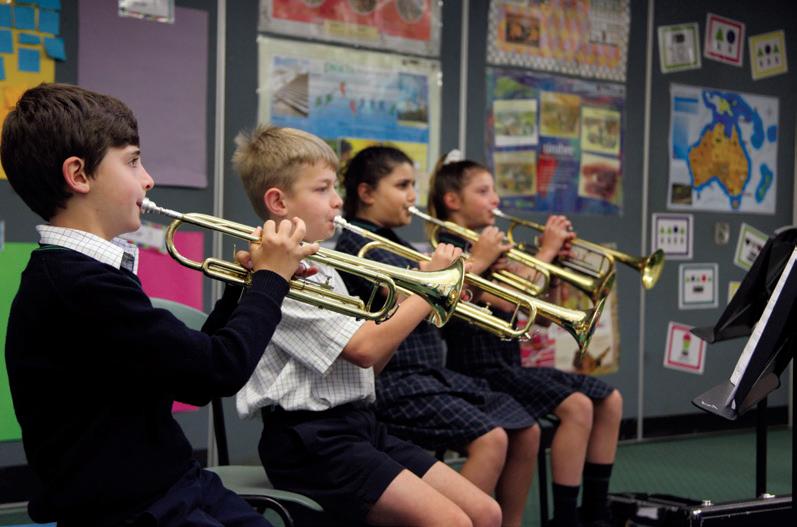
Music is an important area of learning for our students in the Junior School. A great deal of research has documented the many benefits of studying music and learning an instrument.
In Year 3, students explore orchestral music and instruments of the orchestra in their units of inquiry in Music. Through the lens of the various transdisciplinary themes, they make connections with, and through, music across a broad range of musical styles from different times and places. They attend the Year 4 Instrumental Programme learning journey concert at the end of the year to see the older students perform and hear of their instrumental experiences. Students also complete an aural timbre test to help ascertain to which instrumental sounds they are drawn. This has shown to be a significant factor in practising and persevering with an instrument. Students then choose which instrument they would like to play in Year 4. This year we will also hold a session where students can physically try out the various instruments before making their choice.
For several years, our Stage 2 students have intensively studied the violin as part of the Music Curriculum programme. In 2019, our Year 4 students now have a greater range of instruments from which to choose. Once a week, students work in a small group in a forty-five minute lesson to explore violin, ukulele, percussion (drums, glockenspiel, etc.), flute, clarinet, saxophone and trumpet. Some of these instruments belong to the school; others are leased out for the year to accommodate preferences. Students are led by instrumental tutors consisting of Junior School teachers, Secondary School Music teachers and external professional musicians; all of whom have performed professionally in various capacities and are passionate about helping grow lifelong music lovers. Practice is encouraged and these skills are explicitly taught, being the only way to progress. Once their time in the Instrumental Programme is complete, students may continue on their instrument or another with private lessons through the Music Academy. They may also join one of the many Junior School and Secondary School music ensembles.
Gina Mansley Junior School Music Specialist

Here is some feedback from students about the programme: “I like the programme because we learn in an interesting way.” Liam T
“I like the music programme because it is really fun and the best part is learning really challenging songs.” Max “I like that there is a variety of instruments to choose from.” James
“I like trying something new and learning from your mistakes.” Zeena
“I like how the teachers help us.” Abigail “I really enjoy it because I’ve never played an instrument before – it’s really fun.” Zac “It’s fun and I, surprisingly, learnt how to play the ukulele.” Lola “I enjoy the programme and learning about different chords.” Xander
“I enjoy the singing and learning new songs.” Jack
“I like that I can improve my skills and aim to achieve a black belt in music.” Nick
“It’s a really good learning opportunity – I didn’t know how to play the ukulele.” Maggie
“It’s good to learn a new instrument – it is good to come together and express the music.” Tiffany “It’s fun and challenging and we get to sing together.” Ellie
“I like learning new songs – having a smaller group means the teacher can have more time with each student.” Scarlett



STAFF FAREWELLS
St Paul’s has farewelled several staff over the last few months. We thank them for their service and valuable contributions to our school. We wish them well and God’s richest blessings as they move on from St Paul’s.
Amanda Sharpe
The English Faculty have been blessed by Amanda Sharpe’s enthusiasm, skills and knowledge and are very sad to say goodbye to her at the end of 2019. Amanda joined St Paul’s eight years ago as a newly-qualified English teacher. During her time at St Paul’s she has been a committed classroom teacher and an inspiring student leader mentor, amongst many other things. Her involvement in creative writing camp, her organisation of excursions and her voice in creative curriculum development will be missed.
Amanda embraced the wide range of co-curricular opportunities at St Paul’s, demonstrated through her participation in the Duke of Edinburgh Award ‘Adventurous Journeys’, Year 10 and 12 camps, and the Cambodia Service Learning Trip. Amanda will be a wonderful Head of English at Nepean Christian School.
Catherine Stacker
Catherine Stacker is a truly outstanding Mathematics teacher, sorely missed by the staff and students of St Paul’s. Her dedication to her craft and her pedagogical insight helped countless children see the beauty and relevance of Mathematics in real life. Catherine also served faithfully as Castlereagh Head of House wherein she ministered tirelessly to the welfare needs of much of the St Paul’s community. Her legacy, in this regard, includes her leadership in developing the senior student prefect portfolios, as well as the Combined House Days.
Catherine left St Paul’s at the end of Term 2, after ten years of service, to accept an educational leadership position in the United Kingdom where she began her career.
Charlene Peffer
Charlene Peffer left St Paul’s in July 2019. Charlene was an integral part of the St Paul’s community for eight years and we thank her for her passion and dedication to the Dance Academy and Arts Faculty. During her time at St Paul’s, Charlene’s commitment, organisation and creativity was evident in the numerous roles she undertook.
We congratulate Charlene on her new position at St Michael’s Grammar School in St Kilda and wish her all the best for the future.
Christopher Crimmins
Chris began his formal teaching career here at St Paul’s in January 2018. Although his time with us has been short, Chris’ presence will have a long-lasting impact on the future learning for our Science students. St Paul’s has been blessed to have Chris as a member of the school community, sharing his enthusiasm for adventure by involvement in the Duke of Edinburgh programme and in school sport, particularly soccer. Chris leaves St Paul’s at the end of 2019. We wish him all the best for the future as he travels overseas in 2020.
Elizabeth Stringer
The role of School Counsellor is diverse in supporting various members of the school community. Elizabeth Stringer did this so well, whether it was one-to-one chats or running the ‘Veggie Heads’ club where students would tend to the vegetable patch. During her seven and a half years at the school, Elizabeth built a lovely rapport with all she came across and was successful in gaining registration as a psychologist. Elizabeth left St Paul’s at the end of Term 2. She is sorely missed but we know that she will make a profound impact in her new role.
Sandy Facey
Sandy Facey has been the Laboratory Manager in the Secondary School for the last three years. She has been a much loved and valued member of the Science Faculty.
During her time at St Paul’s, Sandy has assisted many students in achieving their Science practical investigations for their International Baccalaureate (IB) Science studies. She has looked after the needs of Science teachers and her assistance has been greatly appreciated. Sandy has taken care of our local wildlife and volunteered to train as a snake catcher. We wish Sandy all the best for the future.
Sue Seckold
At the beginning of Term 3, we farewelled Sue Seckold who left to spend more time with her family. Sue started at St Paul’s as a Pre-Kindergarten Teacher’s Aide. During her time at the school, Sue gained her qualification as an early childhood teacher, a position she cherished. Sue is remembered for her warm and pastoral manner and sense of fun.
We wish Sue all the best as she moves on from St Paul’s.










